Incoterms® - 2020
Incoterms® are essential in the world of logistics. They are standardized globally recognized trade terms and conditions that determine the responsibilities and costs between buyers and sellers in international transportation.
What are Incoterms® 2020
Incoterms® (International Commercial Terms) are the standardized international rights and obligations of sellers and buyers in international transport. These standardized globally recognized trade terms and conditions are created and published by the International Chamber of Commerce to assist traders, carriers, and insurance companies in the purchase, sale, and transportation of goods.
The eleven Incoterms®
1. EXW - Ex Works
The selling party makes the goods available at a predetermined location (e.g., their factory or warehouse) for the buying party. By making the goods available in this manner, the selling party has already fulfilled its obligations. The selling party is not required to load the goods for transportation or prepare the goods for export; this is the responsibility of the buying party.
The risk transfers from the selling party to the buying party when the goods are made available (not loaded) to the buyer.
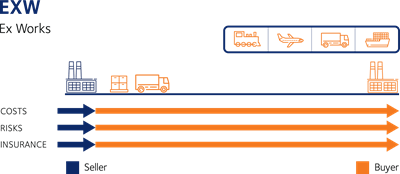
2. FCA - Free Carrier
The selling party delivers the goods to the buying party through one of the following two variations:
- FCA A: In this variation of FCA, the transfer of goods occurs at a location of the selling party (e.g., their factory or warehouse). The goods are officially transferred when they are loaded onto the transportation arranged by the buying party.
- FCA B: In this variation of FCA, the transfer of goods occurs at a location that is not owned by the selling party. The goods are officially transferred when they reach this location (arranged by the selling party), can be unloaded, and are made available for further transport (arranged by the buying party).
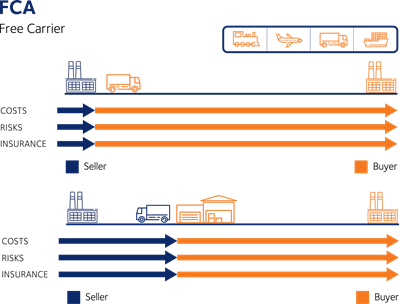
3. CPT - Carriage Paid To
The selling party is responsible for organizing and financing the transportation of the goods to the agreed-upon destination with the buying party. However, please note that the risk of damage to or loss of the goods during transport is transferred to the buying party from the moment the goods are loaded for transport.
The risk is transferred from the selling party to the buying party when the goods are handed over to the carrier (as contracted by the selling party).
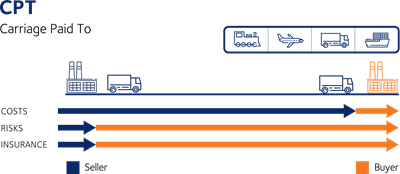
4. CIP - Carriage and Insurance Paid To
The Incoterms® CIP and CPT are not very different from each other. The selling party is responsible for organizing and financing the transportation of the goods to the agreed-upon destination with the buying party. Please note that the risk of damage to or loss of the goods during transport is transferred to the buying party from the moment the goods are loaded for transport.
There is one difference with the Incoterm® CPT: the selling party is also responsible for obtaining a transport insurance for the goods. This insurance covers the transport from the moment the goods are loaded until they arrive at the agreed-upon destination with the buying party. However, the risk of loss or damage to the goods remains with the buying party.
The risk is transferred from the selling party to the buying party when the goods are handed over to the carrier (as contracted by the selling party).
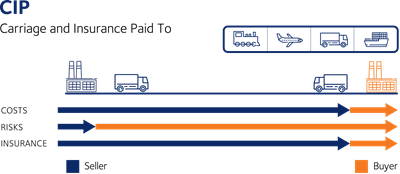
5. DAP - Delivered at Place
The selling party is responsible for organizing and financing the transportation of the goods to the agreed-upon destination with the buying party. The selling party is also responsible for export documentation if required.
The buying party is responsible for customs clearance, taxes, and duties at the agreed-upon destination. The buying party is also responsible for unloading, distribution, or storage of the goods.
The risk transfers from the selling party to the buying party as soon as the goods (still not unloaded) reach the agreed-upon destination.
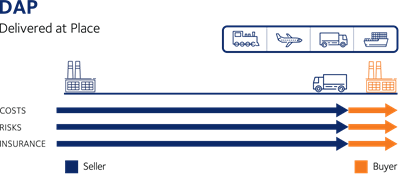
6. DPU – Delivered at Place Unloaded
The selling party is responsible for organizing and financing the transportation of the goods to the agreed-upon destination with the buying party. The selling party is also responsible for export documentation if required. Please note that the selling party is also responsible for unloading the goods at the agreed-upon destination.The buying party is responsible for customs clearance, taxes, and duties at the agreed-upon destination.
The risk transfers from the selling party to the buying party when the goods are fully unloaded at the agreed-upon destination.
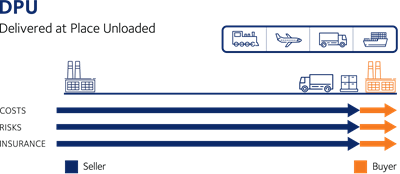
7. DDP – Delivered Duty Paid
The selling party is responsible for organizing and financing the transportation of the goods to the agreed-upon destination with the buying party. In this process, the selling party is responsible for export documentation. The selling party is also responsible for customs clearance, taxes, and duties at the agreed-upon destination.
The buying party is responsible for unloading the goods.
The risk transfers from the selling party to the buying party as soon as the goods (still not unloaded) reach the agreed-upon destination.
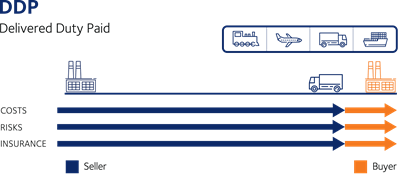
The following Incoterms® are only applicable to sea freight shipments
8. FAS – Free Alongside Ship
The selling party is responsible for organizing and financing the delivery of the goods alongside the ship at the agreed-upon port of departure with the buying party. The goods must be ready for loading onto the ship. The buying party is responsible for loading the ship. This Incoterm® is commonly used in the transportation of bulk or breakbulk cargo.
The risk transfers from the selling party to the buying party from the moment the goods are located alongside the ship. From that point onward, the buying party bears all costs.
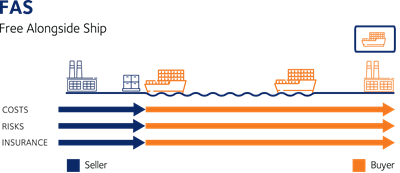
9. FOB – Free on Board
The selling party is responsible for organizing and financing the delivery of the goods at the port of departure. The selling party is also responsible for loading the goods onto the vessel nominated by the buying party. Additionally, ensuring proper export documentation and customs permits are the responsibility of the selling party.
The buying party is responsible for customs clearance, taxes, and duties at the agreed-upon destination port.
The risk transfers from the selling party to the buying party when the goods are loaded onto the ship. From that point onward, the buying party bears all costs.
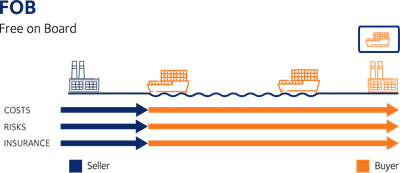
10. CFR - Cost and Freight
The selling party is responsible for organizing and financing the transportation of the goods to the, with the buying party, agreed-upon port of departure. They are also responsible for the costs of sea transport to the agreed-upon destination port. Additionally, ensuring proper export documentation and customs permits is the responsibility of the selling party.
The buying party is responsible for customs clearance, taxes, and duties at the agreed-upon destination port.
The risk transfers from the selling party to the buying party at the moment when the goods are loaded onto the ship at the, with the buying party, agreed-upon port of departure.
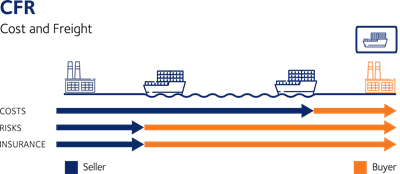
11. CIF – Cost Insurance and Freight
The selling party is responsible for organizing and financing the transportation of the goods to the agreed-upon port of departure with the buying party. They are also responsible for the costs of sea transport to the agreed-upon destination port. Additionally, ensuring proper export documentation and customs permits is the responsibility of the selling party. The selling party is also responsible for obtaining a transport insurance for the goods, which covers transportation up to the destination port.
The risk transfers from the selling party to the buying party at the moment when the goods are loaded onto the ship at the agreed-upon port of departure with the buying party.
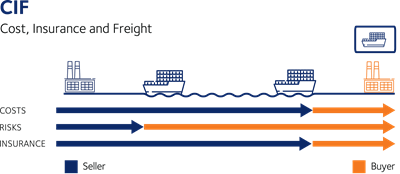
More information
Click here to download the Incoterms® 2020 in PDF format. For more information about Incoterms® 2020, you can visit the website website of the International Chamber of Commerce.
The Incoterms® Rules are protected by copyright owned by ICC. Further information on the Incoterm® Rules may be obtained from the ICC website. Incoterms® and the Incoterms® 2020 logo are trademarks of ICC. Use of these trademarks does not imply association with, approval of or sponsorship by ICC unless specifically stated above.
Any questions?
Our experts are ready to help. Get in touch and we'll find the solution you need.


